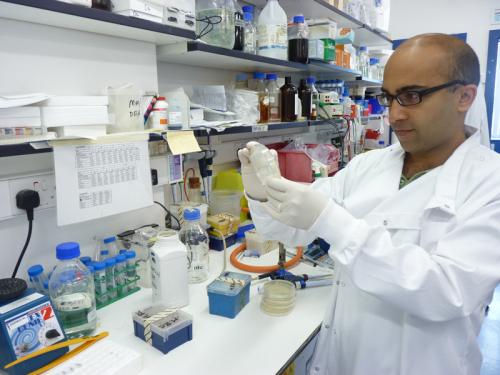
Miratul Muqit awarded Wellcome Trust Senior Clinical Fellowship
Miratul Muqit, a Clinician and Programme Leader in the MRC-PPU, has been awarded a prestigious Wellcome Trust Senior Research Fellowship in Clinical Science to continue his groundbreaking studies on the regulation and function of the Parkinson's disease associated enzymes PINK1 and Parkin.
Miratul is a clinically active Neurologist who treats patients with Parkinson's. During his graduate studies he played a major role in the discovery of PINK1 mutations in patients with familial Parkinson's. Miratul had previously shown that PINK1 was localized to the mitochondria but little was known on the catalytic activity of PINK1 since the enzyme appeared to be inactive when expressed by various methods. He joined the MRC-PPU in 2008 as a Wellcome Trust Intermediate Clinical Fellow to work with Dario Alessi to investigate the regulation and function of the PINK1 kinase.
Over the last 5 years, Miratul has made several fundamental discoveries relating to the PINK1 kinase. These have culminated in the elucidation of a signaling pathway for PINK1 in which PINK1, upon activation by mitochondrial depolarization, directly phosphorylates the RING-IBR-RING E3 ligase, Parkin, at Serine 65. This then leads to activation of Parkin E3 ligase activity.
Over the next 5 years, Miratul's lab will focus on determining how disruption of PINK1-Parkin signaling ultimately leads to Parkinson's. In particular he will address how PINK1 is activated; define new substrates for PINK1; and determine physiological substrates for the Parkin E3 ligase. In parallel he hopes to generate state-of-the-art phospho-specific antibodies to study PINK1-Parkin signaling in Parkinson's patients with a view to developing the first biomarkers for the disease.
Commenting on the award Miratul said: 'This funding boost from the Wellcome Trust is really a reflection of the many talented people who have contributed to the project including a trio of fantastic PhD students, Helen Woodroof, Chandana Kondapalli and Agne Kazlauskaite. Our work would also not have been possible without the outstanding research environment and resources of the MRC Unit as well as generous funding from the Wellcome Trust.'
'We have entered a really exciting phase of our research and over the next few years we hope to have a much better understanding of how PINK1 and Parkin mutations lead to Parkinson's. This may lead to novel ideas to better diagnose and treat the disorder.'
Dario Alessi, Director of the MRC Unit added: 'I am delighted that Miratul has been able to secure this highly sought after fellowship to pursue his valuable research into better understanding the molecular causes of Parkinson's. Miratul is on the cusp of making some tremendous breakthroughs in the area of PINK1 and Parkin biology that could lead to new ideas about how to better treat and diagnose Parkinson's in the future. Miratul is the first clinician working in Dundee to ever secure a Wellcome Trust Senior Research Fellowship in Clinical Science and is currently the only Clinician in Scotland to hold one of these positions. The University of Dundee MRC Unit is privileged to be able to host Miratul's research laboratory'
Miratul is a clinically active Neurologist who treats patients with Parkinson's. During his graduate studies he played a major role in the discovery of PINK1 mutations in patients with familial Parkinson's. Miratul had previously shown that PINK1 was localized to the mitochondria but little was known on the catalytic activity of PINK1 since the enzyme appeared to be inactive when expressed by various methods. He joined the MRC-PPU in 2008 as a Wellcome Trust Intermediate Clinical Fellow to work with Dario Alessi to investigate the regulation and function of the PINK1 kinase.
Over the last 5 years, Miratul has made several fundamental discoveries relating to the PINK1 kinase. These have culminated in the elucidation of a signaling pathway for PINK1 in which PINK1, upon activation by mitochondrial depolarization, directly phosphorylates the RING-IBR-RING E3 ligase, Parkin, at Serine 65. This then leads to activation of Parkin E3 ligase activity.
Over the next 5 years, Miratul's lab will focus on determining how disruption of PINK1-Parkin signaling ultimately leads to Parkinson's. In particular he will address how PINK1 is activated; define new substrates for PINK1; and determine physiological substrates for the Parkin E3 ligase. In parallel he hopes to generate state-of-the-art phospho-specific antibodies to study PINK1-Parkin signaling in Parkinson's patients with a view to developing the first biomarkers for the disease.
Commenting on the award Miratul said: 'This funding boost from the Wellcome Trust is really a reflection of the many talented people who have contributed to the project including a trio of fantastic PhD students, Helen Woodroof, Chandana Kondapalli and Agne Kazlauskaite. Our work would also not have been possible without the outstanding research environment and resources of the MRC Unit as well as generous funding from the Wellcome Trust.'
'We have entered a really exciting phase of our research and over the next few years we hope to have a much better understanding of how PINK1 and Parkin mutations lead to Parkinson's. This may lead to novel ideas to better diagnose and treat the disorder.'
Dario Alessi, Director of the MRC Unit added: 'I am delighted that Miratul has been able to secure this highly sought after fellowship to pursue his valuable research into better understanding the molecular causes of Parkinson's. Miratul is on the cusp of making some tremendous breakthroughs in the area of PINK1 and Parkin biology that could lead to new ideas about how to better treat and diagnose Parkinson's in the future. Miratul is the first clinician working in Dundee to ever secure a Wellcome Trust Senior Research Fellowship in Clinical Science and is currently the only Clinician in Scotland to hold one of these positions. The University of Dundee MRC Unit is privileged to be able to host Miratul's research laboratory'

